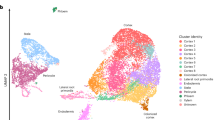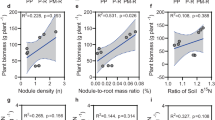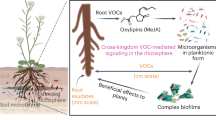Abstract
ABERG'S review1 cites Söding (Die Wuchstofflehre, Georg Thieme Verlag, Stuttgart, Germany, 1952) as suggesting that the generally recognized increased shoot/root ratios resulting from nitrogen fertilization are caused by nitrogen-increased growth hormone content which, in turn, inhibits root growth and promotes shoot growth in the intact plant. This suggestion appears reasonable and was supported by Bosemark2, who compared the growth of roots in high nitrogen solution with that of roots growing in solutions containing growth hormones.
This is a preview of subscription content, access via your institution
Access options
Subscribe to this journal
Receive 51 print issues and online access
$199.00 per year
only $3.90 per issue
Buy this article
- Purchase on Springer Link
- Instant access to full article PDF
Prices may be subject to local taxes which are calculated during checkout
Similar content being viewed by others
References
Aberg, B., Ann. Rev. Plant Physiol., 8, 153 (1957).
Bosemark, N. D., Physiol. Plant, 7, 497 (1954).
Wilkinson, S. R., Ph.D. thesis, Purdue Univ., Lafayette, Indiana. Wilkinson, S. R., and Ohlrogge, A. J., Agron. J., 54, 288 (1962).
Author information
Authors and Affiliations
Rights and permissions
About this article
Cite this article
WILKINSON, S., OHLROGGE, A. Mechanism for Nitrogen-increased Shoot/Root Ratios. Nature 204, 902–904 (1964). https://doi.org/10.1038/204902b0
Issue Date:
DOI: https://doi.org/10.1038/204902b0
Comments
By submitting a comment you agree to abide by our Terms and Community Guidelines. If you find something abusive or that does not comply with our terms or guidelines please flag it as inappropriate.



